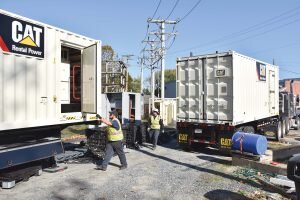By Morgan Pilz, Staff Writer
(Jan. 23, 2020) The Town of Berlin will receive its new electrical power generator much sooner than originally anticipated, Electric Unity Director Tim Lawrence told the Town Council Monday.
“The new generator was supposed to be delivered sometime in May or early June, but I received a call … so it’s actually going to be delivered in April,” Lawrence said.

Additional power sources to compensate for peak usage are trucked into the Berlin Power Plant
on William Street in November.
One of the town’s four electrical power generators went down on July 17 because of what was described as a major failure. A temporary generator had to be installed in November to avoid costing the town more for electricity.
The new generator was not expected to be installed until August or September, but that should change, even though nothing will happen right away, Lawrence said.
“We’re going to have the engine and put it into the building, but there’s a lot of stuff that needs to be done to it prior to it operating,” Lawrence said. “The engine will be put into the building in April when it gets delivered, but there’s all type of piping, cooling that needs to be run into it, the fuel line, electrical … there’s still another month or two worth of work even after the engine gets there.”
Lawrence told the council in August that the failure happened when the department was running peak shaving times. The engine typically runs from about 2-6 p.m., but because of high temperatures, the engine was working overtime and ran for eight consecutive days.
The department conducts peak shaving events when the draw for electricity for the town is unusually high, which occurs about 10 to 23 times during the summer.
Peak-shaving is a way for town ratepayers to save money because by using the local generators, the electric utility has to purchase less power from providers, according to Lawrence.
“By us peak shaving, it normally saves the town ratepayers, electric rate payers about $550,000 per year,” Lawrence said. “If we didn’t have that temporary generator taking its place, if we got called to peak shave for a time, it could cost us up to $200,000 in savings.
“By having the temporary generator, we can obtain those peaks,” he continued. “There are five peaks we have to hit per year, and as long as the temporary is in place, which it is now, we would be able to hit that peak. With the new engine going in, basically, that’s taking the place of the engine that failed.”
The new generator will run on natural gas instead of diesel, which according to Lawrence, will be more efficient. He also said diesel fuel costs $2.30 a gallon as opposed to $1.80 for natural gas.
